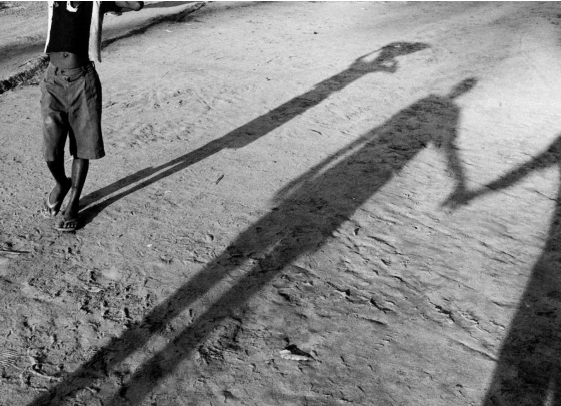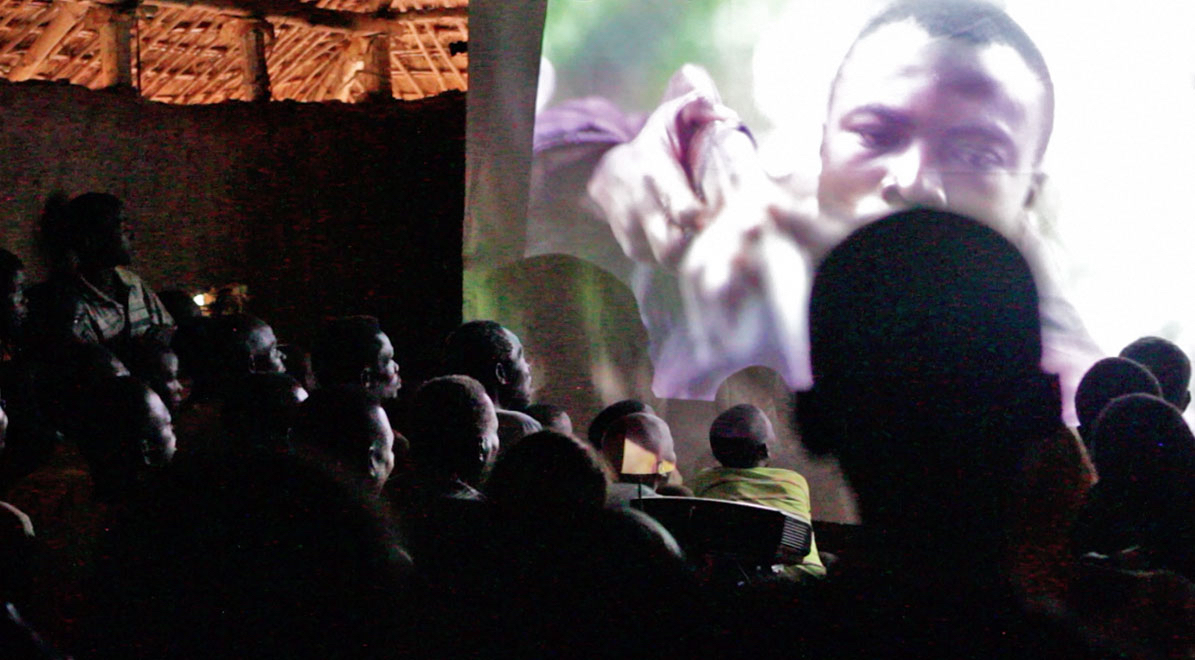Last November, the Harvard Humanitarian Initiative (HHI), a humanitarian research center at Harvard University, published a fascinating report highlighting community resilience in areas affected by Joseph Kony’s Lord’s Resistance Army (LRA).
“We Mobilized Ourselves” highlights the incredibly innovative solutions LRA-affected communities across central and East Africa have developed to protect their families from the LRA, as well as from other threats to their safety. Their report included a case study of our Community Defection Committee and Mobile Cinema programs in Central African Republic (CAR), co-authored by our own Director of Programs, Sean Poole and Lindsay Branham, of Discover the Journey, who helped develop these programs.

Photo credit: Harvard Humanitarian Initiative
Read the excerpt by Sean and Lindsay below, to learn more about how our Mobile Cinema program has helped the town of Mboki in Central African Republic (CAR) protect themselves, and prevent more violence by giving them the resources and understanding they need to dismantle the LRA from within.
Mboki Community’s Response to LRA Returnees
The town of Mboki in the Central African Republic (CAR) offers a case study in a community’s response to LRA returnees. Located near the crossroads of South Sudan, the Central African Republic (CAR) and the northern Democratic Republic of the Congo (DRC), Mboki experiences high levels of LRA activity. To address this threat, Discover the Journey (DTJ) and Invisible Children (IC) partnered with community leaders in 2013 to launch an initiative to both encourage LRA defections and raise awareness among community members about the importance of accepting LRA returnees. Over time, these efforts have resulted in notable success. Through the creation of a Community Defection Committee (CDC) and the use of multimedia education tools, Mboki has welcomed the peaceful surrender of 32 former LRA members since 2013. In addition, these community structures have evolved into a conflict resolution and community-building tool that is now serving broader needs. As one community participant described, “The CDC has brought together different ethnicities and religious groups to set-up a dynamic program [to] welcome defectors and educate the community members on the spirit of forgiveness and, despite the violence inflicted on the community, build peace.”
The idea for the CDC began after in-depth research on the perspectives of LRA-affected communities by DTJ and IC revealed the need for projects that would engage communities to participate in their own protection, rather than rely solely on outside actors. Because of the community’s proximity to LRA activity and its stated interest in engaging in proactive defection and peace-building activities, Mboki was an ideal location for a pilot. The first step involved organizing the CDC to represent Mboki’s diverse ethnic and religious populations fairly. Afterwards, community members were shown an awareness-raising video about the process of escaping from the LRA and returning home. Nearly all community members watched the video and participated in subsequent workshops. This prompted the community to create locally-relevant defection messaging, including informational leaflets detailing how and where LRA members could escape and FM radio programming that encouraged LRA combatants to surrender. The message from Mboki to LRA members was loud and clear: “Come out; you will be safe.”

A Mobile Cinema screening of the film “They Came at Night”
Additionally, the CDC created a direct line of communication to the Uganda People’s Defense Force and U.S. military teams in the region, which allowed for the exchange of timely and accurate information regarding LRA whereabouts. To improve the accuracy of the CDC-reporting mechanisms, U.S. military personnel provided training on map navigation to identify more precisely where interactions with the LRA had occurred. Moreover, through joining Invisible Children’s Early Warning Network, the CDC has linked Mboki to 83 other communities in the CAR and the DRC, as well as to humanitarian and security groups. This increased communication capacity improved the response from security forces, effectively shortening the time between the surrender of LRA members and their handover to appropriate authorities. In February 2014, after the surrender of four LRA in Mboki, Ugandan military forces arrived within three hours to take command of the former combatants and return them to Uganda. Previously, it had taken 24 to 48 hours for defectors to be transported.
As the CDC has gained credibility in the community as a governing body, it has evolved into a general conflict-resolution tool to address any internal or external security threat. The CDC’s “Crisis Committee” was created as a subset of the CDC to monitor tensions within Mboki; it works to prevent or de-escalate conflict. The Crisis Committee also disseminates accurate information about the broader crisis in the CAR, reducing fear and stigma associated with misinformation. Through this work, the CDC has successfully reduced community disputes and encouraged high levels of participation from the town’s diverse population; the CDC’s increased inclusion of minority populations in decision-making mechanisms has fostered collaboration across ethnic and religious lines and diversified the response to crises by providing new tools for the community to utilize when conflict arises.
The CDC is a proven example of how communities can play pivotal roles in violence prevention, mitigation and resolution. One community leader engaged in the project stated: “the CDC has created an opportunity for people here to deal with problems with each other openly and a way for them to feel safe by getting involved in their own protection.” This model of community-based protection programming has now been established in six other communities within the CAR, the DRC and South Sudan with varying levels of success.
Mboki is just one of many isolated and vulnerable, yet resilient communities in central Africa, facing violence and exploitation at the hands to the LRA and other armed groups. Invisible Children has helped to establish similar committees in dozens of communities. We continue to work with more and more local leaders across the region to ensure that every family in central Africa has the safety they deserve.
Think people should hear about this?